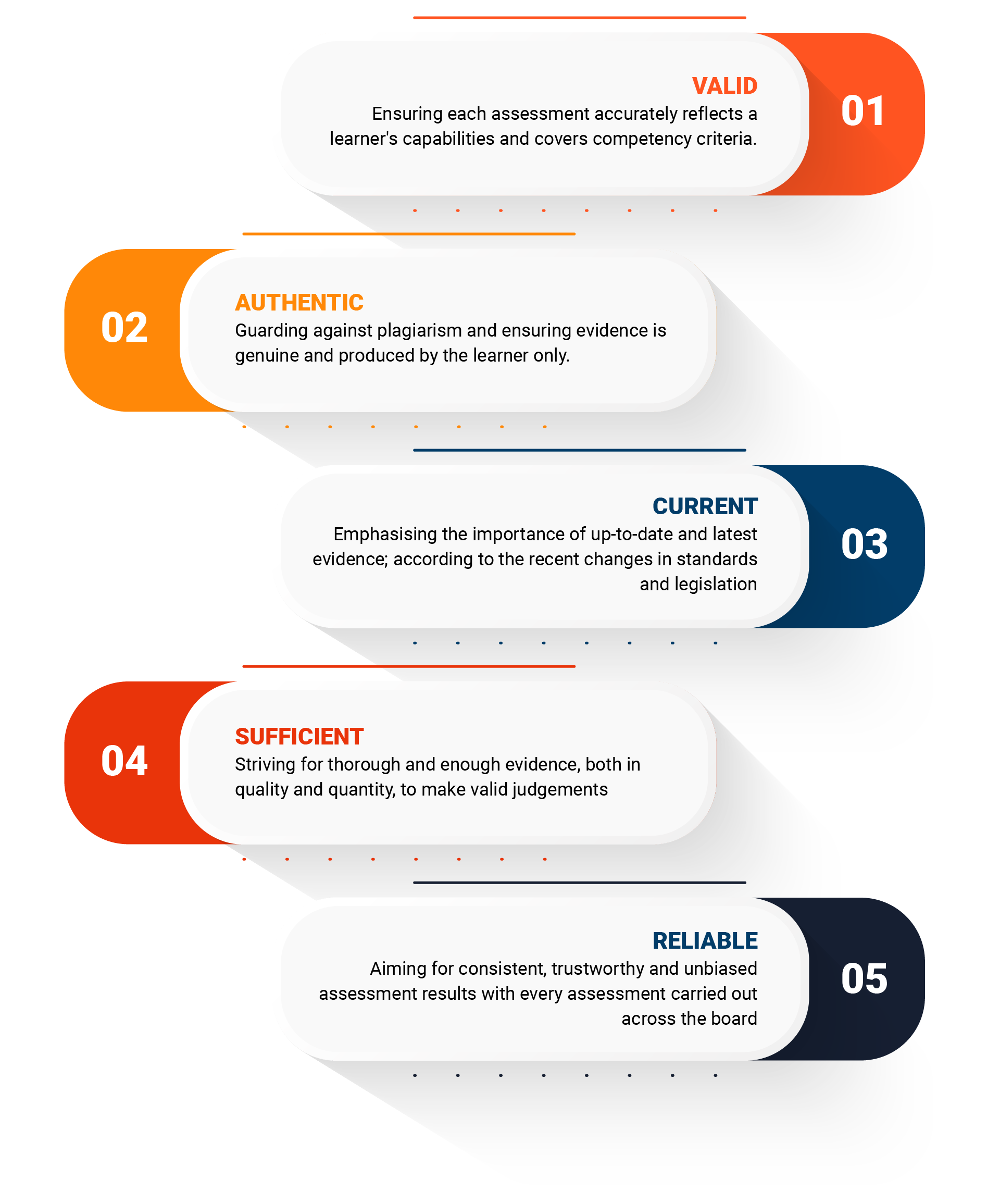The process of gathering data to better understand, analyse and improve the abilities of student learning is called assessment. To put it simply, it is a procedure for measuring, evaluating and documenting a learner’s skill, knowledge and understanding. It is the process of analysing whether students have understood the lesson and developed their learning.
Assessment inspires us to ask questions like, ‘Are we designing the content and teaching methodologies correctly?’ ‘Are students learning what they should be learning?’ or ‘What kind of modifications are needed in lessons to assist students better? And only through assessment can we know the right answers to all these questions. We must understand its core purpose and benefits to ensure we have ample information to make appropriate decisions that could affect students’ learning, teaching methodologies, or even curriculum.
In this article, we will discuss the importance of assessment, its functions and principles, which will help you understand why assessment is important and how it can make a massive impact on teaching and learning.

Functions of Assessment
Though the main function and purpose of assessment is to measure a learner’s competency and performance, it can also help:
- To enable the determination of learners,
- Assessors to evaluate learners’ level of understanding
- To find different methods that can enhance and improve their learning
- To make sure all learners are given a fair chance to learn
- To find the best practices to match assessment methods against the set standard and criteria
Types of Assessment
Well-structured assessment types – initial, formative or summative – will allow them to demonstrate their competence; and as a result, reflect on how much progress they have made and help students understand how far they are from improving their skills and expertise and ultimately achieving their goals and objectives. Types of assessment are categorised based on the point of time they are being conducted i.e., before, during or after the learning.
Some main types of assessments used by assessors:
1. Initial Assessment
An initial assessment refers to the first evaluation or examination conducted to gather information and gain an understanding of a particular situation, individual, or system. The purpose of an initial assessment can vary depending on the context, but it generally involves collecting relevant data, identifying key factors, and establishing a baseline for further analysis or action. In education, teachers often conduct initial assessments of students at the beginning of a school year to gauge their academic abilities, learning styles, and any specific needs they may have. It is also conducted to make sure the learner is eligible to enter the learning process.
2. Formative Assessment
Formative assessment refers to day-to-day informal and ongoing assessment taking place during a course, course or while the learning is occurring. Formative assessment helps identify the weaknesses, struggles, misconceptions and learning gaps that need to be filled.
Formative assessment generally has a low/no point value; to identify whether or not the learning has occurred, you can ask open-ended questions, hold an impromptu class discussion, take short quizzes and much more.
3. Summative Assessment
On the other hand, summative assessment is carried out at the conclusion of the semester, course or a programme, against some set standard or benchmark. It determines the readiness of a student and measure the peak of competence and skills achieved after the learning process is complete. Comparatively, this assessment has a high point value and is strictly graded; some examples of summative assessment include end-of-semester/mid-term exams, a research project, an achievement test or a final project.

Concepts and Principles of Assessment
Now, to measure a learner’s knowledge, skill and understanding, some principles of assessment must be followed to make sure the learner has gained in-depth knowledge and can demonstrate competence and skills in the relevant context.
VACSR Principles
I. Valid
Assessment’s validity principle is crucial to measure a learner’s true capabilities. This is why, the assessment process must be valid, accurate, and fit the purpose. In other words, it must state that the learner has covered the given criteria of competency, completely grasped, and truly captured the required skills, understanding, and knowledge in the relevant qualification. You can ensure the assessment is valid using relevant activities in several contexts.
II. Authentic
In today’s world of AI, the chances of copying and plagiarising content are very easy. The authentic principle aims to ensure that the evidence is not fabricated or plagiarised but is produced by and belongs to the learner only. If the evidence is fabricated, the purpose of achieving any qualification will diminish.
III. Current
The third ‘currency principle’ expresses that the evidence presented and the learner’s own knowledge must be up to date and from the very recent past. It would be inappropriate to accept old evidence especially when standards and legislation have recently been changed.
IV. Sufficient
Sufficient principle aims to make sure the evidence is thorough enough to make a valid judgement on the learner’s competency, mainly referring to the quality and quantity of assessment. For instance, if a learner is asked to provide an answer to the same question but for different levels and qualifications, the learner must do so according to the level of that qualification showcasing knowledge at a particular stage. The sufficient principle ensures that the activities are relevant enough to allow learners to demonstrate their competency which will allow assessors to make a valid and reliable judgement in the end.
V. Reliable
The reliable principle focuses on producing the same consistent results, no matter how many times the assessment is carried out. A reliable and unbiased assessment can be achieved by reviewing your previous assessment results or reviewing your outcomes with other assessors’ outcomes. Also having peers and other experienced assessors review the work at different times in the process, can ensure reliability of decisions.

Transparency & Fairness
Fairness principles focus on identifying and choosing the right assessment method that best fits learners’ needs, context and unit after considering multiple assessment techniques. Assessments ought to be impartial and open. It is crucial that students understand their destination and the route that will get them there “before” they set out on their journey. In order to ease their fears and help the assessor identify any unique needs of any given student. Fair and transparent communication gives them a road map that details every step of the process. The student should not be kept in the dark about how they will be assessed or how to complete the course or gain the certificate. This principle aims for the right, ethical and fair usage of assessment tools and must never compromise the quality and integrity of assessment. Furthermore, the principle also ensures that learners’ well-being, health and safety won’t go unnoticed during assessment.
Assessment Feedback and Progress Review
Students should be involved in the process of receiving feedback on their accomplishments (or lack thereof). By explaining to them how you arrived at your conclusion, you will empower them to ask questions and improve themselves in the future. Feedback and progress reviews play pivotal roles in shaping a journey of continuous improvement. Direct feedback serves as a practical guide, offering insights for the student into both their strengths and areas that need attention. It’s like a roadmap, helping learners navigate their way. And when feedback is paired with regular progress reviews, assessments become a dynamic tool for growth rather than mere glimpses in time. These reviews go beyond just measuring performance—they’re about fostering a mindset of reflection and deliberate goal-setting. The collaborative exchange between assessors and learners transforms assessments into a pragmatic process.

How is Assessment Beneficial for Teachers?
Teachers work hard all year long to ensure their students grasp each concept efficiently. However, if teachers do not evaluate their students, there is no point in putting all the effort into teaching. By utilising different methods of assessment and utilising them as a tool, they cannot only assess how their students are learning but also if their teaching methods are effective or not. In settings requiring a qualified assessor, the teacher and assessor can both collaboratively play a unified role in the students’ progress. On another note, educational staff also benefit from assessment methods. They can identify gaps in their curriculum, course material or teaching methodologies to make sure learning is showing up and students are learning in the best ways possible.
If you are a teacher, here is how assessment will be beneficial for you:
- Evaluate your students and easily determine if they met the learning objectives or standards.
- Navigate where they lack, what issues they are facing, their strengths and weaknesses which ultimately leads you to come up with new and effective teaching benefits.
- Provide well-rounded feedback on their progress after close observation and tell them which areas need improvement.
- With the feedback, you can also navigate whether your teaching methods or activities need modifications or not.
Conclusion
To sum up, as a teacher, assessing your students’ progress is crucial to their success. Similarly, as a student, assessment is essential for improving your learning outcomes. It is a natural part of the teaching and learning process. Our students need to not only learn theoretical concepts but also apply them practically in real-world scenarios. In doing so, teachers must evaluate and measure their learning via some assessment principles so that they can provide an appropriate and authentic assessment. Further read on how to achieve level 3 A1 assessor course.
-
Focus Awards Level 3 Certificate in Assessing Vocational Achievement (RQF)
Rated 4.90 out of 5£64.17 – £340.00 Select options -
Level 3 Award in Assessing Competence in the Work Environment (RQF)
Rated 0 out of 5£45.77 – £240.00 Select options -
Level 3 Award in Assessing Vocationally Related Achievement (RQF)
Rated 0 out of 5£45.77 – £240.00 Select options



